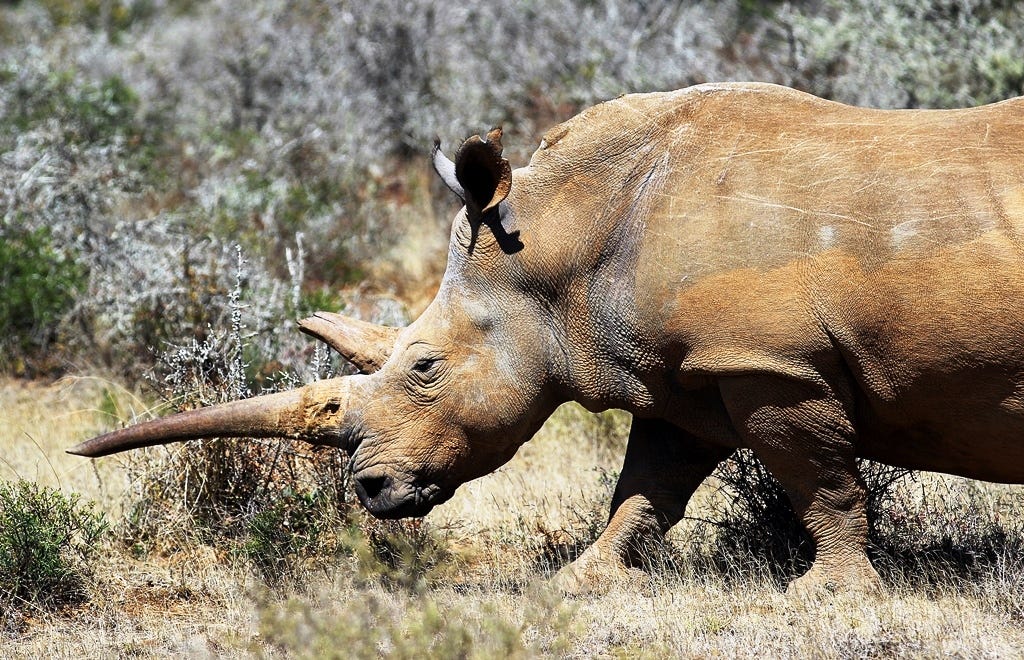When rhinos make news headlines it is usually for disturbing reasons. This is one of those stories that is truly distressing and more than a little mystifying.
It is the story about an American citizen who was arrested on his game farm in Limpopo province in the north of South Africa. The Directorate for Priority Crime Investigation, known locally as ‘the Hawks’, arrested Texan Derek Lewitton following the discovery of 26 rhino carcasses on his Harmony game farm near Gravelotte.

Police (SAPS) spokesperson in Limpopo Province, Brigadier Hlulani Mashaba, said the raid followed a tip-off from a reliable source indicating that Lewitton was in possession of unlicensed firearms and rhino horns without a permit. The operation to arrest the American began in the morning of 22 December under the personal supervision of Deputy Provincial Commissioner for Limpopo Province, Major-General Jan Scheepers. The arrest just before midnight, came after an intensive 16-hour long investigation into activities on the game farm.
Scheepers described the scene:
“The place looked like a slaughterhouse. Everywhere you looked, there were rhinos lying dead. We found 26 carcasses, but I can tell you there is bound to be many more”
He said “When we searched the house, we found 17 rhino horns in the safe. Seven were marked and had paperwork in order. The other ten horns were unmarked without any paperwork”. The Hawks seized horns worth R10 million (about 540,000 dollars).
Scheepers added, “The law is very clear. Once you find a rhino in the veld, no matter if it has been killed, or has died of natural causes, you are not allowed to remove the horns. You must report it to the SAPS (police) and to the department of nature conservation”.
The Hawks confiscated seven unlawfully acquired firearms and hundreds of rounds of ammunition as well as the suspect’s laptop and cell phone.
Lewitton was charged for the unlawful possession of firearms under the Firearms Act, as well as charges under the National Biodiversity Act. Additional charges might be added following further investigations.
He is currently in jail (2 January 2024) and will only appear in court for a bail hearing tomorrow.
Lewitton is a controversial self-proclaimed activist advocating for the legal trade of rhino horn. The rationale for his position can be found on his web site here. The gist of his argument is that game farmers should be allowed to commercialise rhino horns in order to bring the international prices down and thus reduce the incentive for poachers to risk their lives.
He argues that the legalised sale of rhino horn would finance conservation efforts, give game farmers added incentive to keep rhinos on their farms and provide revenue for the government in the form of taxes.
Puzzling aspects of Lewitton’s arrest
Certain aspects of Lewitton’s arrest are somewhat mystifying and suggest that there might be more to this story than meets the eye. For example, is it possible that there is a link between his arrest in December and a case he opened with the South African Police Services (SAPS) in March, 2023? In his complaint he claimed that a trunk containing 20 rhino horns had been stolen from his farmhouse while he was in Johannesburg. Lewitton admitted that the trunk was not in a safe. This is peculiar. Why would someone leave more than half a million dollars’ worth of (possibly undocumented) rhino horn lying around the house?
If he was trading illegally in rhino horns, why would he tell the police that they had been stolen? Criminals don’t usually lodge official complaints with the police if their merchandise has gone missing. Scheepers confirmed that this case is still under investigation.
It seems unusual that a senior police officer such as a Major-General would lead a team made up of members of the Directorate for Priority Crime Investigation, Crime Prevention Visible Policing, the Polokwane Tactical Response Unit, the Firearms Unit, and the Local Criminal Records Centre – all this to raid a game farm.
It appears that no media were invited on the raid, and no photographs have been made available to the public. This is unusual because inevitably in a high profile case such as this one, police want to show how efficiently they are cracking down on the illegal trade of rhino horns.
Lewitton was arrested on 22 December and will be kept in prison until his bail hearing on 3 January 2024 – 12 days later. This is harsh as most bail hearings are held within two to three days of an arrest. Yes, it is the festive season, but is it fair on the accused?
Many posts on social media have stridently demanded a long jail sentence and various forms of cruel punishment for Lewitton. The posts invariably allege that he killed the rhinos in order to get rich. This does not make sense. Why would he kill the rhinos if they are producing valuable (U$10,000 plus) horns every two years?
Piecing together information from various sites online, it appears that Derek Lewitton has a Jurisprudence Doctorate from the Stanford University. He bought the 3,000-hectare Black Rock Rhino farm in Limpopo province about six years ago. The reserve had a herd of around 200 in 2021 and he claims that the population doubles every two years. It has not been possible to verify this information and there has been no response from enquiries using Black Rhino Rock contact details.
Lewitton is clear that game farming for conservation purposes is an expensive business. Black Rock Rhino has three projects aimed at bringing in revenue. Rhino Camp seems to be some sort of educational camp where school children and university students can learn more about rhinos. Operation Rhinbow is a social outreach project engaging with local rural communities. The third project aims to sell NFTs (Non Fungible Tokens) in international auctions. Black Rock Rhino has partnered with South African blockchain technology company Virtual Nation Builders, to tokenize rhino horns from the sanctuary into NFTs.
Why are rhino horns so valuable?
According to the Save the Rhino web site, rhino poaching is driven by demand for rhino horn in Asian countries, particularly China and Vietnam. It quotes traditional Chinese texts stating that rhino horn has been used in Chinese medicine for more than 2,000 years and is used to treat fever, rheumatism, gout, and other disorders. These texts allege that horns can cure snakebites, hallucinations, typhoid, headaches, carbuncles, vomiting, food poisoning, and ‘devil possession’.
Spare the rhinos . . . It’s only keratin
A high proportion of rhino horns are exported to Vietnam. Researchers at the University of Copenhagen, Hoai Nam Dang Vu and Martin Reinhardt Nielsen, decided to find out why that is so1. They interviewed 30 self-confessed, recent users of rhino horn and one trader from well-off residents of Hanoi, capital of Vietnam.
The researchers discovered that Vietnamese people use the horns for a variety of reasons ranging from the treatment of hangovers to projecting an image of success in business. Wealthy citizens also use horns to honour terminally ill relatives even though they are fully aware that the treatment has no chance of curing the patient.
They also found that consumers preferred wild rhino horn over farmed rhino horn although there doesn’t seem to be an obvious way to tell the difference between the two. Furthermore, it appears that those who purchased the horns weren’t affected by stigma or concerns about rhino populations.
Real Safari links:
Other links:
Hoai Nam Dang Vu & Martin Reinhardt Nielsen (2018) Understanding utilitarian and hedonic values determining the demand for rhino horn in Vietnam, Human Dimensions of Wildlife, 23:5, 417-432, DOI: 10.1080/10871209.2018.1449038








What a curious case. Thank you for the balanced reporting.
I have one question... the Asian people who use the horns, have they been getting the rhino horns from Africa for the past 2000 years?